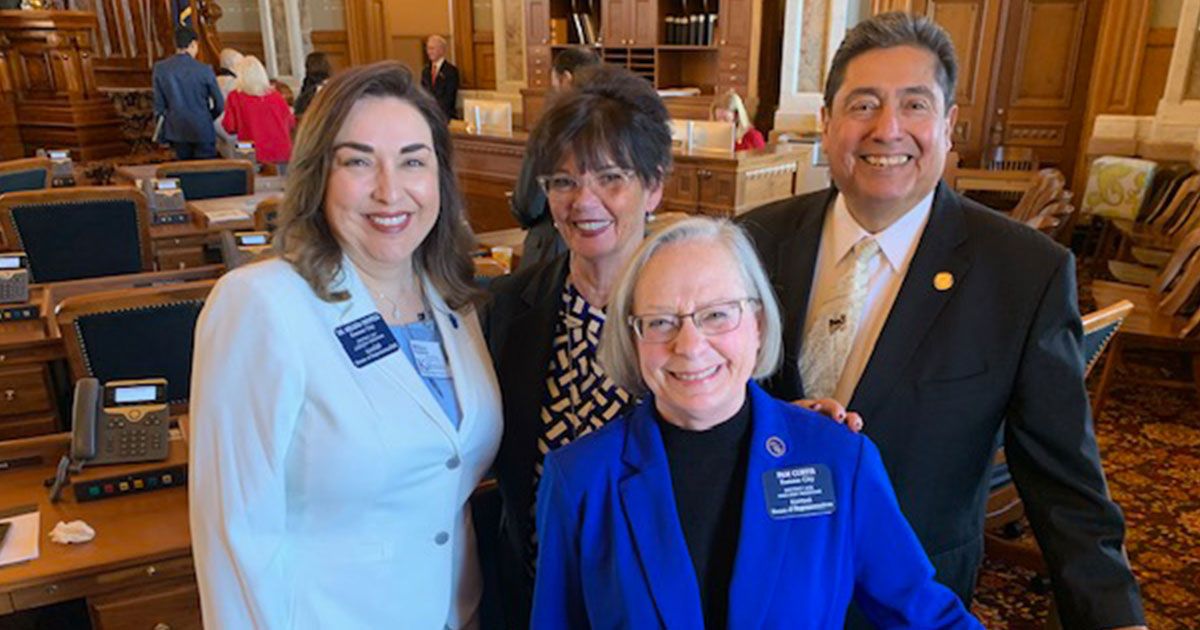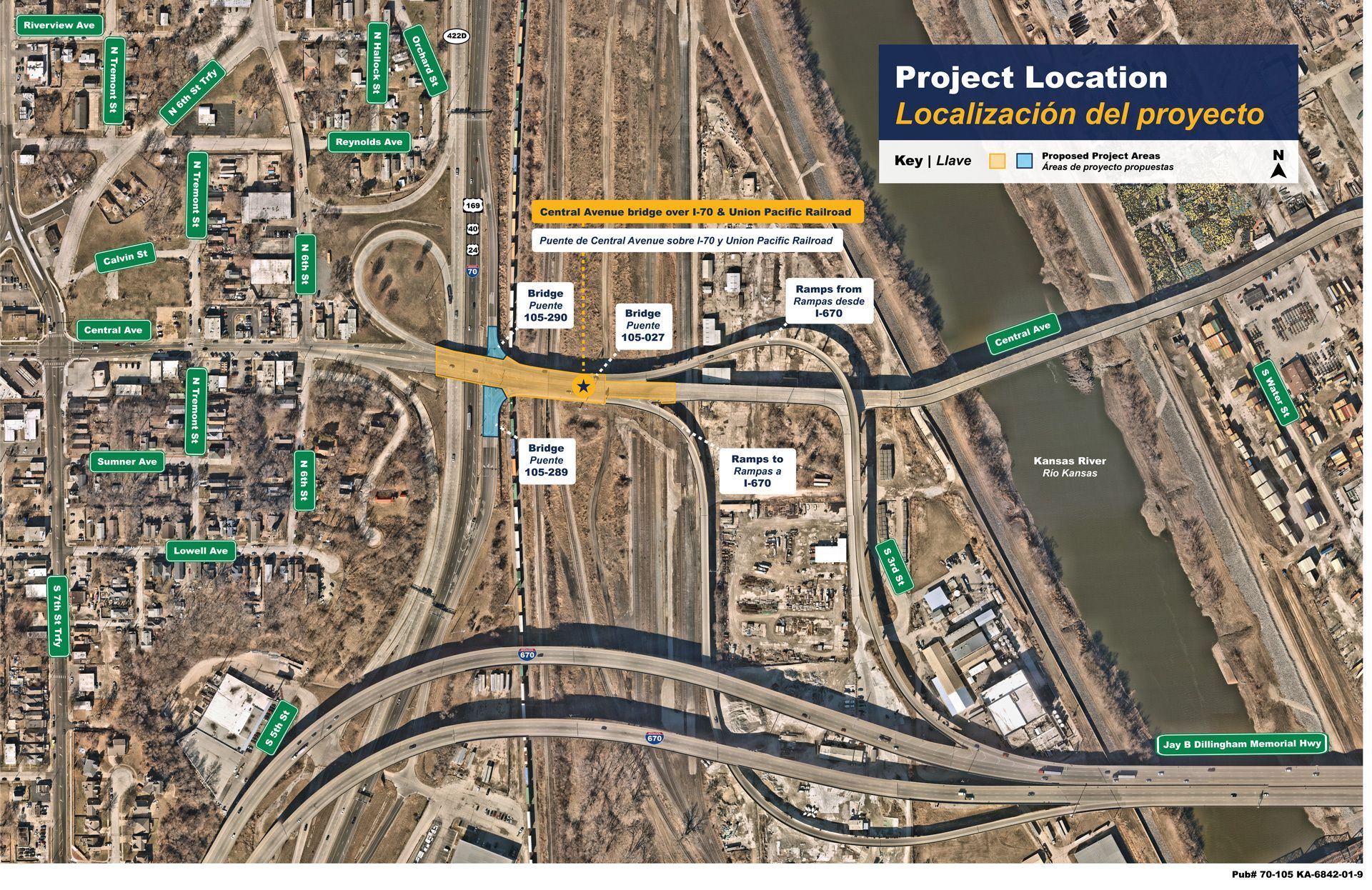2023 Legislative Update 7
2023 Legislative Update 7
February 20 - February 27
The House spent Wednesday and Thursday on the floor debating and voting over five dozen bills. Hot button issues like voter suppression and LGBTQ rights sucked the oxygen out of the room, but bipartisan wins around the Ogallala Aquifer gave reason to celebrate.
This week was “Turnaround Week,” which is the deadline for when bills must pass out of their originating chamber, or they die. There are exceptions for bills in “exempt” committees, which are House Fed & State, Calendar & Printing, Tax, and Appropriations. Select bills that did not meet the Turnaround deadline may be “blessed” by the Speaker of the House and given later attention.
Sadly, HB 2028, to provide for an automated process for the expungement of criminal records for not guilty, dismissals and diversions was one of the bills that “died” at Turnaround. Attempts to have it moved above the line or “blessed” were unsuccessful. More about that below.
On Tuesday, Joe Reardon, President of the Greater Kansas City Chamber and Dred Scott, President of the Civic Council were in Topeka to share information with legislators about the exciting things happening in the KC region. Joe provided a wonderful lunchtime presentation at the Capitol about how the KC Region is growing, transforming and impacting the economic landscape throughout the state. Legislators from all over Kansas attended the lunch presentation and continue to talk about the many exciting things shared that are on the horizon for the KC area. Of particular interest is the new airport that opens this week and the World Cup which will no doubt have a far-reaching impact not only to the KC Region but throughout the State. It is an exciting opportunity during the World Cup when the world’s eyes will be on us, and we must be ready to leave a lasting positive impression of Kansas!
Washington Days, the Democrats’ annual conference was held on Friday and Saturday. Congratulations to newly elected KDP Chairwoman Jenna Repass and KDP Vice Chair Shaun Junkins as they take the helm at an exciting, always challenging time with many opportunities! Wishing them the best as they navigate the often-difficult waters of party politics. We are stronger together and if everyone keeps that in mind we will grow as others will want to join us.
It is a special honor to serve as your state representative. I value and appreciate your input on issues facing state government. Please feel free to contact me with your comments and questions. My office address is Room 452-S, 300 SW 10th, Topeka, KS 66612. You can reach me at
(785) 296-7430 or call the legislative hotline at
(800) 432-3924 to leave a message for me. You can also e-mail me at pam.curtis@house.ks.gov.
Kansas Democratic Party Elects Jeanna Repass
Secretary of State candidate Jeanna Repass
was elected chair of the Kansas Democratic Party on Saturday at the party’s annual Washington Days conference. Repass went up against -- or as she put it, “in addition to,” former Lt. Governor and State Treasurer Lynn Rogers.
The duo had a tumultuous few weeks in the lead-up to Washington Days, which was ultimately reflected in the final vote: 122 to 107. However, both Repass and Rogers made visible, intentional efforts to model a unified front. Both repeatedly shook hands, hugged, and celebrated forward progress and an exciting future for the Kansas Democratic Party.
Shaun Junkins was elected as vice chair on a unanimous voice vote. Shaun is a Business Agent for District 70 of the International Association of Machinists and Aerospace Workers in Wichita. District 70 includes several local lodges. It is good for Labor to have a seat at the table in party business.
HB 2028: Automated process for expungement of records
Sadly, HB 2028, to provide for an automated process for expungement of criminal records for those found not guilty or those who have completed diversion did not make it above “the line” for a vote in the House before Turnaround.
I am not sure what the objection could possibly be to this legislation, which began as a bi-partisan effort that the House Judiciary Committee thought worthy of pursuit. The bill is based on a recommendation by the Kansas Judicial Council. Every single issue brought forth has been addressed, and there were no opponents. The bill passed the House Judiciary Committee unanimously last session and again this session yet Republican Leadership still will not allow it to move forward.
This is a policy that would help remove a barrier for employment, housing, education, giving people a second chance and helping meet workforce needs for Kansas businesses, so it simply makes no sense why the Republican leadership will not move this and other similar policies forward.
It is very discouraging for those that work so hard on behalf of many that otherwise would not have a voice in this process to pass legislation that will help improve their lives and quite honestly the lives of all of us.
It is shortsighted when policies that will help people have a better life are not allowed to move forward. We know the key to that is having a good job, a place to live, and access to food and medical care. Essential needs that we all need to survive. I do not understand why the Republican Leadership is so callous when it comes to issues facing so many of our hard-working Kansans by not allowing good policy such as HB 2028 to move forward.
Debating Droboxes
A hotly contested
bill removing the 30-day grace period from mail ballots passed the House in a
77-45 vote on Wednesday. The move is a notable pivot from 2017, when the grace period was created in a 123-1 dote. Current Kansas law ensures mail ballots are counted if the ballot is postmarked by Election Day
and received by local election officials by 5:00 P.M. on the Friday following the election.
Under the legislation, any ballot received after 7:00 P.M. on Election Day would not be counted. Kansas Secretary of State Scott Schwab opposed the bill, saying “We’ve been really vocal on supporting drop boxes.” Secretary Schwab has been acknowledged by voters and Democrats statewide for his commitment to touting safe and secure elections in the face of rampant election-related conspiracy theories.
Schwab testified opposite Attorney General Kris Kobach. Kobach argued before the committee that “ballot harvesting” -- the idea that political operatives manipulate dozens or hundreds of absentee ballots before leaving them at dropboxes -- happens with “significant regularity.” There is no evidence of this happening in the state. Current law allows an individual to return only 10 or fewer ballots, in a situation such as a nursing home worker returning ballots for patients.
“This idea that people have lost confidence in elections is because we have a bunch of loonies running around saying it was … fraud without a single bit of evidence to support that case,” said House Democratic Leader Vic Miller, who sponsored the 2017 legislation creating the grace period and is considered an election law expert in the state. “But yes, if you repeat an incorrect statement often enough, unfortunately, some people begin to believe it,” he concluded.
In recent years, voting rights advocates have expressed concern about the increasingly unpredictable timing of ballots delivered by the U.S. Postal System. Opponents to HB 2056 believe the bill will have the most significant effects on rural voters, whose snail mail has been hit the hardest by the shifts at USPS. In some areas of the state, including rural Kansas, mail is often routed to New Mexico, Colorado, or Missouri for processing. However, in Wyandotte and Johnson County, for example, the mail is sent just over the state line and back. This means the bill may have a more disenfranchising effect on some voters than others, based exclusively on geography.
Additionally, the House approved
HB 2053. This would keep drop boxes in Kansas -- all 167 -- but assign the Secretary of State’s office to work with local officials in creating regulatory oversight of the boxes. The bill passed
109-12, with opponents acknowledging Schwab’s vocal support for drop boxes, but ultimately expressing concern that future Secretaries of State may not share his commitment.
The vote puts the House at odds with the Senate, which voted to remove dropboxes altogether.
The legislation failed to pass with the two-thirds votes necessary to override a veto from Governor Laura Kelly.
‘Eddie the Eagle:’ Free NRA Advertising in the #KSLeg
A hearing was held on
HB 2304 the National Rifle Association’s controversial “Eddie the Eagle” gun training program.
Opponents to HB 2304 point to a study from the American Academy of Pediatrics that deemed the program ineffective from nearly 20 years ago, an unpredictable cost to the state, and a lack of need. Schools currently offer firearm safety training approved by the Kansas State Board of Education. Opponents also stated that students should not be responsible for firearm safety; instead, adults and guardians should ensure access to appropriate usage and storage training for firearm owners.
Governor Kelly previously vetoed a similar bill. The governor cited legislative overreach, explaining the program was outside of the legislature’s jurisdiction and curriculum decisions should be left up to the state board of education and local school boards.
Saving Kansas Water
Two years after the creation of the House water committee, the House debated
HB 2279 and
HB 2302. The bills put Kansas one step closer to the preservation of the Ogallala Aquifer.
First, what is a “groundwater management district?” The Kansas Groundwater Management District
Act establishes five GMD's in Kansas. Leaders in each district are responsible for the oversight and managerial duties of their districts. Action is critical; some areas of the aquifer are estimated to only have 10 to 20 years left before complete depletion.
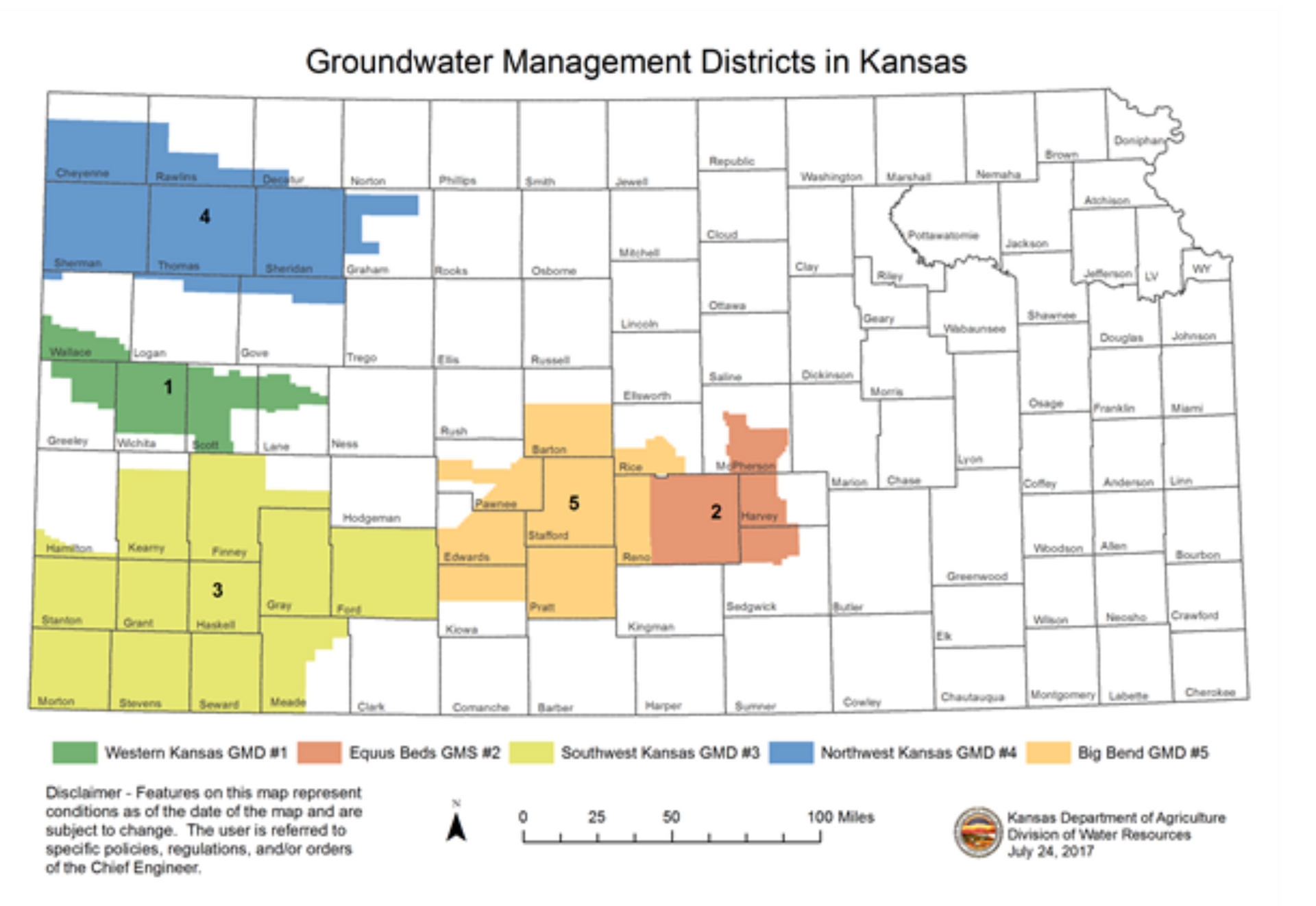
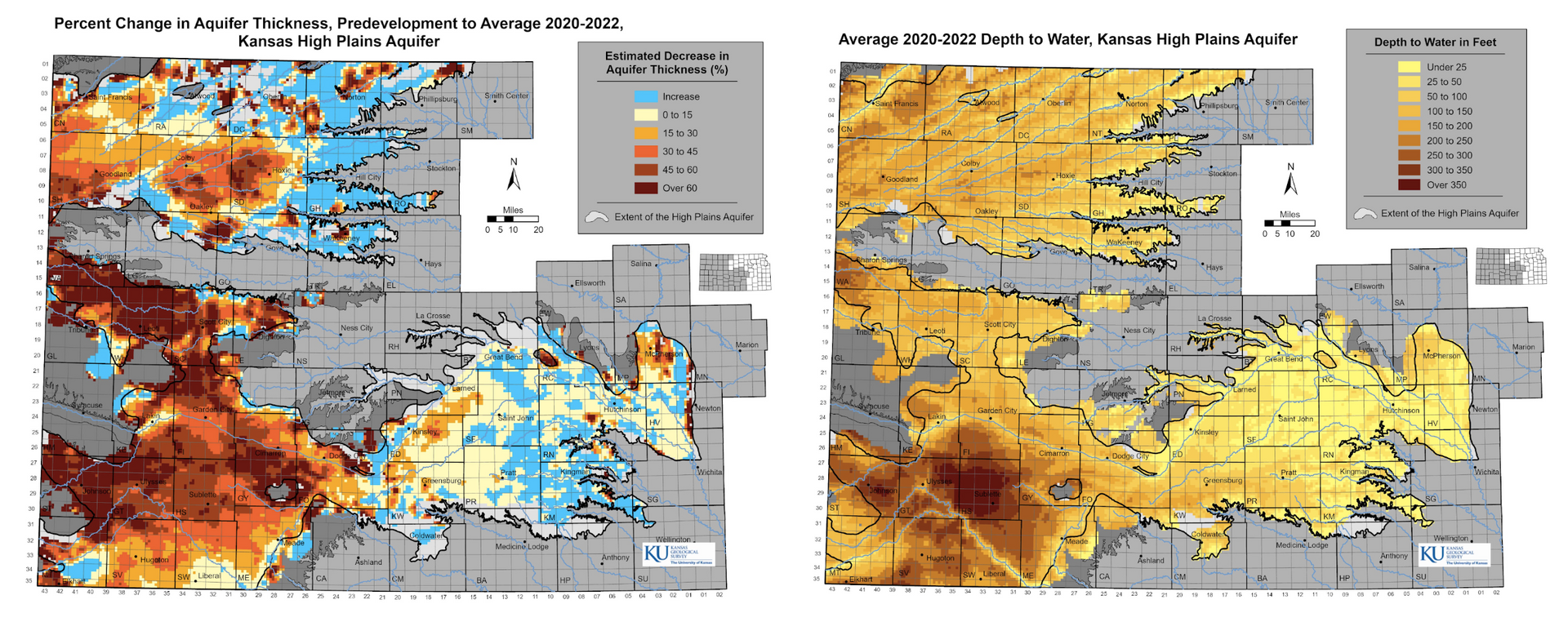
Under HB 2279, GMDs will be required to identify spots in the Ogallala Aquifer with the worst depletion and submit annual written water conservation plans to the legislature. They will provide these to the chief engineer.
The basics of HB 2279:
- GMDs have until July 2024 to identify the priority areas of concern. These are places where the aquifer’s depletion is the worst.
- GMDs will have until July 2026 to submit plans for reducing water in those areas. The plans will be approved or denied by the state’s chief water engineer.
- If the GMDs fail to act, Kansas can intervene and force action. Incentives are in place to help stakeholders avoid this scenario.
HB 2302 assigns 1.231% of state sales tax revenue to support state water plans: the water technical assistance fund and the water projects grant fund. These funds are for water-related infrastructure projects. A portion of the revenue from the sales and compensating use tax will go to the state water plan fund.
Fast Facts on Kansas Water
- 86% of Kansas farmers agree that water should be saved for future generations.
- 90% of Kansas farmers agree that water should be conserved or saved.
- 67% of Kansans are concerned about Kansas running out of water.
Rep. Lindsay Vaughn, who serves on the Water Committee has been at the forefront of water conservation legislation. In a Wednesday floor speech she said, “I was having a conversation with the carrier of the bill the other evening and he asked me, ‘Why do you care about this issue? What makes you passionate?”
She explained, “I feel like there is still hope, there is still an opportunity to save the aquifer for people in my generation and after us in Kansas. This issue has really brought people together and that work has been exemplified in our committee. That is something I’m really proud to be a part of.”
Targeting Trans Youth… Again
The GOP’s fixation on children’s genitalia continues for the third straight year. In a Wednesday floor debate, the House took on
HB 2238 -- the so-called “Fairness in Women’s Sports Act,” -- which is about everything except women.
HB 2238 claims to support girls’ athletics in K-12 and college arenas. However, the bill does not provide any funding or resources to women’s athletics. Rather, it is a framework for state-sanctioned discrimination against children who are already prone to suicidal ideation and mental health crises.
The Human Rights Commission, the nation’s largest LGBTQ+ civil rights organization, released a denunciation of the legislation calling the bill an “unconscionable, targeted attack on transgender and non-binary Kansans, aimed at preventing them from simply living as their authentic selves for no reason at all, other than discrimination.”
Cathryn Oakley, the HRC’s State Legislative Director and Senior Counsel, said the bill “demonstrates that legislators in Kansas are spending far too much time attacking the LGBTQ+ community and far too little time trying to solve real problems. We ask the Kansas legislature to stop these assaults on LGBTQ+ people and to inform their decisions with facts, not fear and misinformation spread by anti-LGBTQ+ extremists.”
What do you need to know about HB 2238?
The legislation is targeted at TWO transgender kids in the entire state of Kansas.- The bill’s language allows for genital inspections of children as young as 5 years old, without any guidance regarding who is to perform the inspections.
- Similar versions of the bill in other legislatures have cost states hundreds of thousands of dollars in litigation costs.
- The Kansas State High School Athletic Association (KSHSAA) has a policy in place that works. There is no need to over-legislate and over-regulate.
- The economic impact of anti-transgender legislation is significant. For example the NCAA made it abundantly clear that states with this kind of discriminatory legislation will not be considered to host athletic events ,and the World Cup would not be coming to Kansas City if Kansas if previous versions of this bill passed.
- Republican governors in other states have vetoed identical legislation, calling it “discriminatory” and “hateful.”
The Trevor Project’s
2022 National Survey on LGBTQ Youth Mental Health reported:
- 58% of LGBTQ youth reported experiencing symptoms of depression
- …including nearly two-thirds of transgender and nonbinary youth
- 93% of transgender
and nonbinary youth said that they have worried about transgender people being denied access to gender-affirming medical care due to state or local laws.
- 91% of transgender and nonbinary youth said that they have worried about transgender people being denied access to the bathroom due to state or local laws.
- 55% of transgender boys have been physically threatened or harmed.
- Nearly 1 in 2 transgender girls have been physically threatened or harmed.
- 86% of transgender boys reported that they have experienced discrimination based on their gender identity.
The bill ultimately passed
82-40 with 2 Republicans voting with Democrats. The Governor has vetoed the legislation for the past two years. The legislature has repeatedly failed to override her veto.
From the House Floor
- HB 2089: Modifying the requirement to report individuals who solicit memberships on behalf of prepaid service plans from semi-annually to annually and upon application for registration and discontinuing payment of annual registration fees for such plans. Passed on a voice vote.
- HB 2090: Authorizing the commissioner of insurance to set the amount of certain fees. Passed on a voice vote.
- HB 2284: Adding fire districts to the definition of "municipality" for purposes of the payment of COBRA premiums under certain circumstances. Passed on a voice vote.
- HB 2285: Updating certain statutory references in Chapter 40 of the Kansas Statutes Annotated. Passed on a voice vote.
- HB 2024: Expanding legal surrender of an infant to include newborn safety devices. Passed on a voice vote.
- HB 2097: Removing the requirement of a documented written demand for premiums as part of a prima facie case against agents or brokers who fail to pay premiums due. Passed on a voice vote.
- HB 2098: Adding certain legal entities to the definition of "person" thereby making such entities subject to penalties for violations of insurance law. Passed on a voice vote.
- HB 2094: Specifying certain requirements necessary to demonstrate fiscal soundness for health maintenance organizations and medicare provider organizations applying for certificates of authority. Passed on a voice vote.
- HB 2160: Exempting the transport of cotton bales from the secured load requirements under certain conditions. Passed on a voice vote.
- HB 2082: Authorizing counties to create a code inspection and enforcement fund and a municipalities fight addiction fund, and expanding the scope of county equipment reserve fund to include other technology expenses. Passed on a voice vote.
- HB 2092: Reapportioning the districts of certain members of the Washburn university board of regents who are appointed by the city of Topeka.
- HB 2332: Updating references and corresponding changes related to 2021 Executive Reorganization Order No. 48 and the transfer of the division of tourism from the department of wildlife and parks to the department of commerce.
- HB 2149: Allowing distinctive license plates to be personalized license plates. Passed on a voice vote.
- HB 2298: Designating a portion of interstate 435 as the Officer Donald Burton Gamblin Jr memorial highway. Passed on a voice vote.
- HB 2127: Adjusting time requirements linked to notice by publication and mailing in the Kansas probate code.
- HB 2130: Increasing certain dollar amounts in the Kansas probate code. Passed on a voice vote.
- HB 2131: Providing that the mission of the judicial council is to study the administration of justice in Kansas and make recommendations for improvements therefore. Passed on a voice vote.
- HB 2047: Increasing the amortization period on loans from the Kansas water pollution control revolving fund. Passed on a voice vote.
- HB 2279: Requiring groundwater management districts to submit annual written reports to the legislature and to provide water conservation and stabilization action plans to the chief engineer.
- HB 2302: Modifying the distribution of moneys into the state water plan fund, creating the water technical assistance fund and the water projects grant fund for water-related infrastructure projects and distributing a portion of the revenue from the sales and compensating use tax to the state water plan fund.
- HB 2039: Exempting disabled veterans from certain requirements and fees relating to hunting and fishing licenses.
- HB 2240: Requiring the clerk of the district court to give notice of qualified residential treatment program placement.
- HB 2173: Ensuring that refrigerants that are approved for use under federal law may be used in Kansas.
- HB 2086: Amending statutes concerning election procedures and election officials.
- HB 2087: Directing political parties to have procedures for the selection of presidential electors.
- HB 2056: Requiring all advance voting ballots to be returned by 7 p.m. on election day.
- HB 2133: Allowing a surcharge when purchases are made with a credit or debit card.
- HB 2291: Providing an exemption from the Kansas food code to permit microbreweries to allow dogs on the premises
- HB 2292: Enacting the Kansas apprenticeship tax credit act to encourage development of apprenticeship programs in Kansas by providing income tax credits for participating businesses that employ apprentices.
- HB 2378: Authorizing the secretary of administration on behalf of the Kansas department for aging and disability services to convey lands in Shawnee county to the Kansas commission on veterans’ affairs.
- HB 2238: Creating the fairness in women's sports act to require that female student athletic teams only include members who are biologically female
- HB 2197: Providing a procedure for the distribution of a first-time home buyer savings account balance upon the death of an account holder, changing the term "transfer on death" to "payable on death" and resolving a conflict when beneficiaries differ on a financial institution's account records and tax forms required by the secretary of revenue
- HB 2019: Establishing conditions for when a driver is an independent contractor for a transportation network company.
- HB 2020: Providing that the employment status of a driver of a motor carrier does not change as a result of the inclusion of safety improvements on a vehicle
- HB 2236: Establishing parents' right to direct the education, upbringing and moral or religious training of their children including the right to object to harmful and inappropriate educational materials
- HB 2034: Requiring a referral of an alleged victim of child abuse or neglect for an examination as part of an investigation, creating a program in the department of health and environment to provide training and payment for such examinations.
- HB 2080: Authorizing students enrolled in a virtual school to take virtual state assessments.
- HB 2081: Creating the aspiring future teacher of the year scholarship program; such scholarships based on the recipients of the Kansas teacher of the year award backgrounds and attributes; making and concerning appropriations for the program for fiscal years ending June 30, 2024, June 30, 2025, June 30, 2026, June 30, 2027, and June 30, 2028, for the department of education for such scholarships.
- HB 2263: Authorizing pharmacy technicians to administer certain vaccines.
- HB 2140: Increasing the age range of able-bodied adults without dependents required to complete an employment and training program to receive food assistance.
- HB 2141: Requiring custodial and non-custodial parents to cooperate with child support enforcement programs and disqualifying such parents for being delinquent in payments.
- HB 2172: Enacting the uniform trust decanting act.
- HB 2322: Revising the definition of "children with disabilities" for purposes of providing special education to replace emotional disturbance with emotional disability.
- HB 2264: Enacting the no patient left alone act to allow in-person visitation to certain patients at hospitals, adult care homes and hospice facilities.
- HB 2191: Authorizing the children's cabinet to form a 501(c)(3) for fundraising for the Dolly Parton imagination library book gifting program.
- SB 11: Reauthorizing the placement of a life-size version of the "Ad Astra" sculpture on state capitol grounds, transferring the approval authority to the capitol preservation committee and making appropriations for the department of administration for FY 2023.
- HB 2114: Renaming the joint committee on corrections and juvenile justice oversight in honor of Representative J. Russell (Russ) Jennings and requiring the committee to monitor the implementation of juvenile justice reforms.
- HB 2335: Authorizing loans or grants for qualified track maintenance in the rail service improvement program and increasing the transfer from the state highway fund to the rail service improvement fund.
- HB 2147: Requiring any individual or agency selling an abandoned or towed vehicle to acquire a certificate of title from the division of vehicles before the sale and exempting such vehicles from vehicle registration requirements.
- HB 2346: Providing for the back the blue license plate.
- HB 2023: Creating the crime of interference with the conduct of a hospital, providing criminal penalties for violation thereof and increasing the criminal penalties for battery of a healthcare provider who is employed by a hospital.
- HB 2338: Designating sickle cell disease awareness week and requiring KDHE to study and report on topics related to sickle cell disease.
- HB 2053: Authorizing the secretary of state to adopt rules and regulations for the use of remote ballot boxes for the return of advance voting ballots.
- HB 2395: Continuing in existence certain exceptions to the disclosure of public records under the open records act.
- HB 2293: Requiring prosecutors to disclose their intent to introduce testimony from a jailhouse witness and to forward related information to the Kansas bureau of investigation.
- HB 2326: Extending the sunset date on the scrap metal theft reduction act and clarifying that catalytic converters are covered by the act.
- HB 2376: Prohibiting the recording of any restrictive covenant that violates the Kansas act against discrimination and authorizing the removal of such covenants from existing documents, and prohibiting city or county laws prohibiting discrimination that are more restrictive than state law.
- HB 2196: Expanding deferred retirement option program (DROP) membership to all Kansas police and firemen's retirement system members.
- HB 2198: Providing membership affiliation in the Kansas police and firemen's retirement system for certain law enforcement officers and employees of the Kansas department of wildlife and parks.
- HB 2184: Abolishing the judicial council fund; transferring all moneys and liabilities of such fund to the state general fund; repealing the transfer of funds from docket fees to the judicial council fund; and transferring annually unencumbered funds from the publications fee fund to the state general fund.
- HB 2408: Exempting certain services provided in an adult care homes from the provisions of the acts regulating cosmetologists and barbers.
- HB 2323: Providing for the detachment and transfer of fire district property annexed by a city.
- HB 2325: Adding maternity center to the definition of "healthcare provider" for purposes of the healthcare provider insurance availability act.
- Sub HB 2121: Substitute for HB 2121 by the Committee on Judiciary - Extending the suspension of statutory speedy trial time limitations and providing that time during the COVID-19 public health emergency shall not be assessed against the state.
- HB 2350: Creating the crimes of human smuggling and aggravated human smuggling and providing penalties therefor.
- HB 2387: Providing funding for STAR bond districts to replace lost food sales tax revenue, authorizing renovation and construction costs for historic theaters as eligible STAR bond project costs and extending the deadline for the STAR bond report to certain legislative committees.
- HB 2398: Adding the placing of controlled substances into pills into the definition of manufacture, increasing the criminal penalties for manufacturing fentanyl and creating a special sentencing rule to make sentences for distributing fentanyl presumptive imprisonment.
- HB 2299: Directing the secretary for children and families to consider foster parents as prospective adoptive parents under certain circumstances.
- HB 2216: Removing the mandatory term of imprisonment as a penalty for driving with license that is canceled, suspended or revoked for failure to pay fines.
- HB 2226: Extending the time period for notice of excavations and permitting use of virtual whitelining for excavations.
- HB 2336: Increasing bonding authority to $10,000,000 under the surplus property and public airport authority act.
- HB 2139: Creating the crime of abuse of a sports official and providing criminal penalties therefor.
- HB 2260: Increasing the number of medical student loan agreements that may be provided by the university of Kansas school of medicine and prohibiting impediments to switching between residency programs.
- HB 2392: Updating the Kansas code of military justice relating to certain definitions, unlawful acts and punishment requirements thereof.
- HB 2340: Requiring the behavioral sciences regulatory board to process applications within a certain time, decreasing the years of practice required for reciprocity licensure of certain behavioral sciences professions, extending the license period for temporary licenses, establishing new license categories and decreasing continuing education requirements related to diagnosis and treatment.
- HB 2288: Enacting the counseling compact to provide for interstate practice privileges for professional counselors.
- HB 2375: Establishing the temporary candidacy baccalaureate and masters social work licenses and providing requirements and fees therefor.
- HB 2390: Establishing the Kansas overdose fatality review board and excluding tests to detect the presence of fentanyl, ketamine, flunitrazepam or gamma hydroxybutyric acid in a substance from the definition of drug paraphernalia.
- HB 2138: Creating the career technical education credential and transition incentive for employment success act to provide additional state aid to certain school districts for students who obtain career technical education credentials.
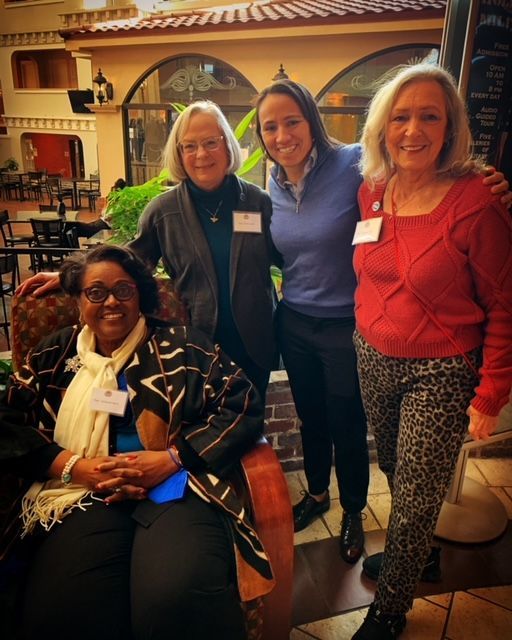
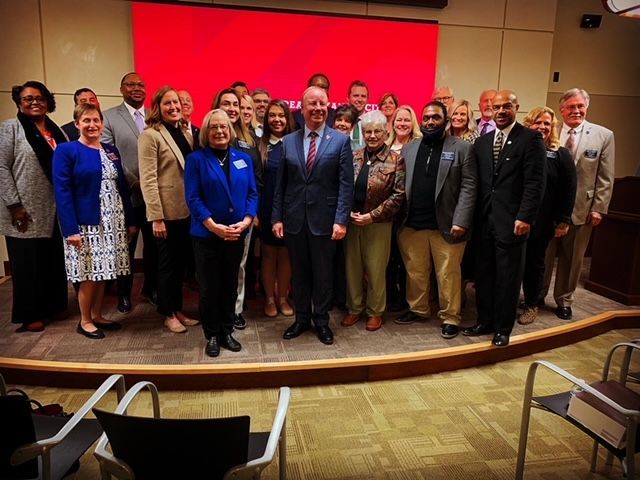
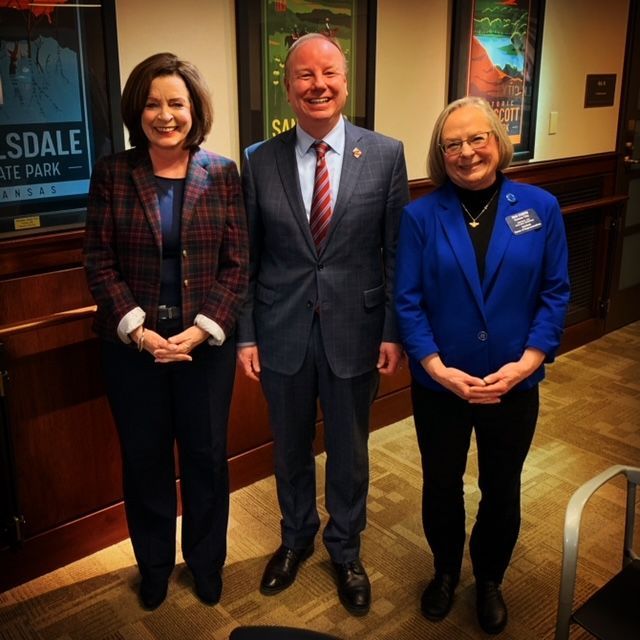
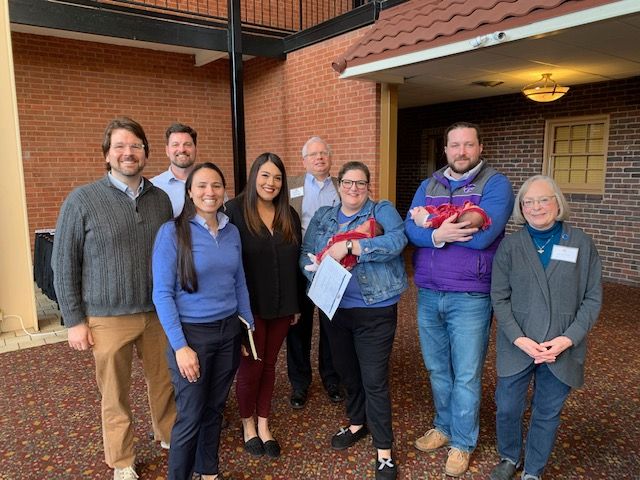
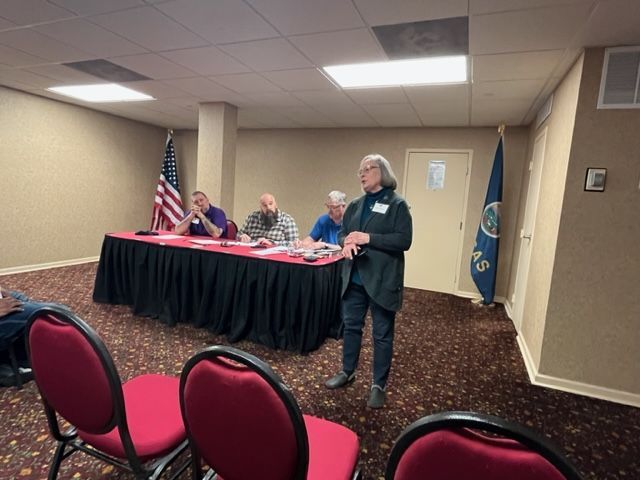
Contact Rep. Pam Curtis
Thank you for reaching out. Please allow 48 to 72 hours for Rep. Curtis to respond to your communication.
Oops, there was an error sending your message.
Please try again later, or email Rep. Curtis directly at info@curtisforkck.com.

